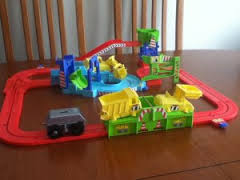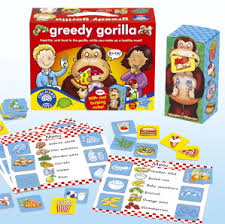
Nearly a decade ago, my brother bought my nephew a birthday present. It was a motorised train set, where, once built, you could watch the train and truck move around the track, picking up goods, taking them to a loader where they then get picked up again.
It looked a bit like this
I helped set up the toy and watched in amazement as the train and truck did their things like poetry it motion.
And I watched. And watched. And watched.
After not too long, I realised something. The toy required no interaction from myself, or my four year old nephew. In fact, we could have gone to lunch, come back an hour later, and it would still be there doing it's thing.
And this is exactly how I feel about Snakes & Ladders. As I've previously discussed, S&L has no decisions to be made, and therefore other than rolling the dice and moving the pieces, the players aren't really part of the game. Or to put it another way, if during a game of S&L, someone needed to take a break, another player could easily take their turns for them without impacting the game at all. Therefore in many ways, S&L is no different to the Big Loader pictured above. It's just not that engaging after a while and therefore it's worthwhile seeing what else is available.
If you're in the UK, you may be aware of Orchard Toys.You may even have a couple of them:
It looked a bit like this
I helped set up the toy and watched in amazement as the train and truck did their things like poetry it motion.
And I watched. And watched. And watched.
After not too long, I realised something. The toy required no interaction from myself, or my four year old nephew. In fact, we could have gone to lunch, come back an hour later, and it would still be there doing it's thing.
And this is exactly how I feel about Snakes & Ladders. As I've previously discussed, S&L has no decisions to be made, and therefore other than rolling the dice and moving the pieces, the players aren't really part of the game. Or to put it another way, if during a game of S&L, someone needed to take a break, another player could easily take their turns for them without impacting the game at all. Therefore in many ways, S&L is no different to the Big Loader pictured above. It's just not that engaging after a while and therefore it's worthwhile seeing what else is available.
If you're in the UK, you may be aware of Orchard Toys.You may even have a couple of them:

These games are the perfect step up the gaming ladder. Many of them are based around the concept of finding certain tiles, which is great for developing memory. They are bright and colourful which also appeals to young children, and many of them, like the one pictured above, make sounds (in this case a burp, which young children (and grown men), seem to find very amusing.
The Orchard range also contain some games that team specific skills - such as telling the time ("Tell the Time") and simple addition and subtraction ("Bus Stop").
We have quite a few of these games for Benji, and he used to really enjoy them . In fact, we used to find him playing these games by himself a lot of the time, even fairly recently. Whilst he has now outgrown these, they have been packed away ready for when Jennifer is a bit older.
There are lots of other games available though in mainstream stores such as Toys 'R Us or even the big supermarkets. Are they all good?
Well, no, not really. They all do a job, but some are much better than others. For instance, compare well known games such as 'Hungry Hippos' and 'Frustration' - which is better, which sees more playtime and why?
For our household, it is certainly Frustration, which even now gets played occasionally, whereas Hungy Hippos is just taking up space. Why is one better than the other?
In my opinion (and after all, that's what this blog is about), there's a couple of reasons. Let's start with Hungry Hippos.
In this game, each player has a hippo which they control with a lever. Many small balls are placed into the dish in the middle, and then all players try and 'eat' as many balls as possible by pressing the lever as quickly as they can. The one with the most balls at the end wins. You can probably guess where I'm going with this - like Snakes & Ladders, there's very few decisions to be made here. Yes, there is interaction, but actual decisions are non-existence. It's all about pressing that lever as quickly as possible, like a hamster running around a wheel.
Compare that to Frustration. In this game you roll a dice (using a 'popper' in the middle of the board), and move your pieces. However, this time you have more than one piece (4 to be precise) and if you have multiple pieces active you can chose which one to move. If one of your pieces lands on an opponents piece they get sent back to the home spot. Suddenly there are decisions, risks, player interaction, and yes, the opportunity to play nasty. But most importantly for children, this is an opportunity to learn, to have the first forays into strategy, and to see cause and effect in action - what happens if they move here, which piece should they move, should they knock you back to home, or get themselves safe.
Now it's fair to say that Frustration isn't the pinnacle of strategy gaming, but based on what your children have played so far, it's a start. It's baby steps, but a great introduction to the types of games they will be progressing to. And some valuable skills that are useful in all aspects of life (bet you'll look at Frustration in a new light!)
Of course, these still games still don't hold much interest for adults - after all, we are still talking about very simple decision making. So, what can we play that will bridge the gap between adults and children? I'm glad you asked - and we'll talk more about this in a future blog entry (I know, I'm such a tease).
Now, time for the EastEnders drum synthesiser.
The Orchard range also contain some games that team specific skills - such as telling the time ("Tell the Time") and simple addition and subtraction ("Bus Stop").
We have quite a few of these games for Benji, and he used to really enjoy them . In fact, we used to find him playing these games by himself a lot of the time, even fairly recently. Whilst he has now outgrown these, they have been packed away ready for when Jennifer is a bit older.
There are lots of other games available though in mainstream stores such as Toys 'R Us or even the big supermarkets. Are they all good?
Well, no, not really. They all do a job, but some are much better than others. For instance, compare well known games such as 'Hungry Hippos' and 'Frustration' - which is better, which sees more playtime and why?
For our household, it is certainly Frustration, which even now gets played occasionally, whereas Hungy Hippos is just taking up space. Why is one better than the other?
In my opinion (and after all, that's what this blog is about), there's a couple of reasons. Let's start with Hungry Hippos.
In this game, each player has a hippo which they control with a lever. Many small balls are placed into the dish in the middle, and then all players try and 'eat' as many balls as possible by pressing the lever as quickly as they can. The one with the most balls at the end wins. You can probably guess where I'm going with this - like Snakes & Ladders, there's very few decisions to be made here. Yes, there is interaction, but actual decisions are non-existence. It's all about pressing that lever as quickly as possible, like a hamster running around a wheel.
Compare that to Frustration. In this game you roll a dice (using a 'popper' in the middle of the board), and move your pieces. However, this time you have more than one piece (4 to be precise) and if you have multiple pieces active you can chose which one to move. If one of your pieces lands on an opponents piece they get sent back to the home spot. Suddenly there are decisions, risks, player interaction, and yes, the opportunity to play nasty. But most importantly for children, this is an opportunity to learn, to have the first forays into strategy, and to see cause and effect in action - what happens if they move here, which piece should they move, should they knock you back to home, or get themselves safe.
Now it's fair to say that Frustration isn't the pinnacle of strategy gaming, but based on what your children have played so far, it's a start. It's baby steps, but a great introduction to the types of games they will be progressing to. And some valuable skills that are useful in all aspects of life (bet you'll look at Frustration in a new light!)
Of course, these still games still don't hold much interest for adults - after all, we are still talking about very simple decision making. So, what can we play that will bridge the gap between adults and children? I'm glad you asked - and we'll talk more about this in a future blog entry (I know, I'm such a tease).
Now, time for the EastEnders drum synthesiser.
 RSS Feed
RSS Feed